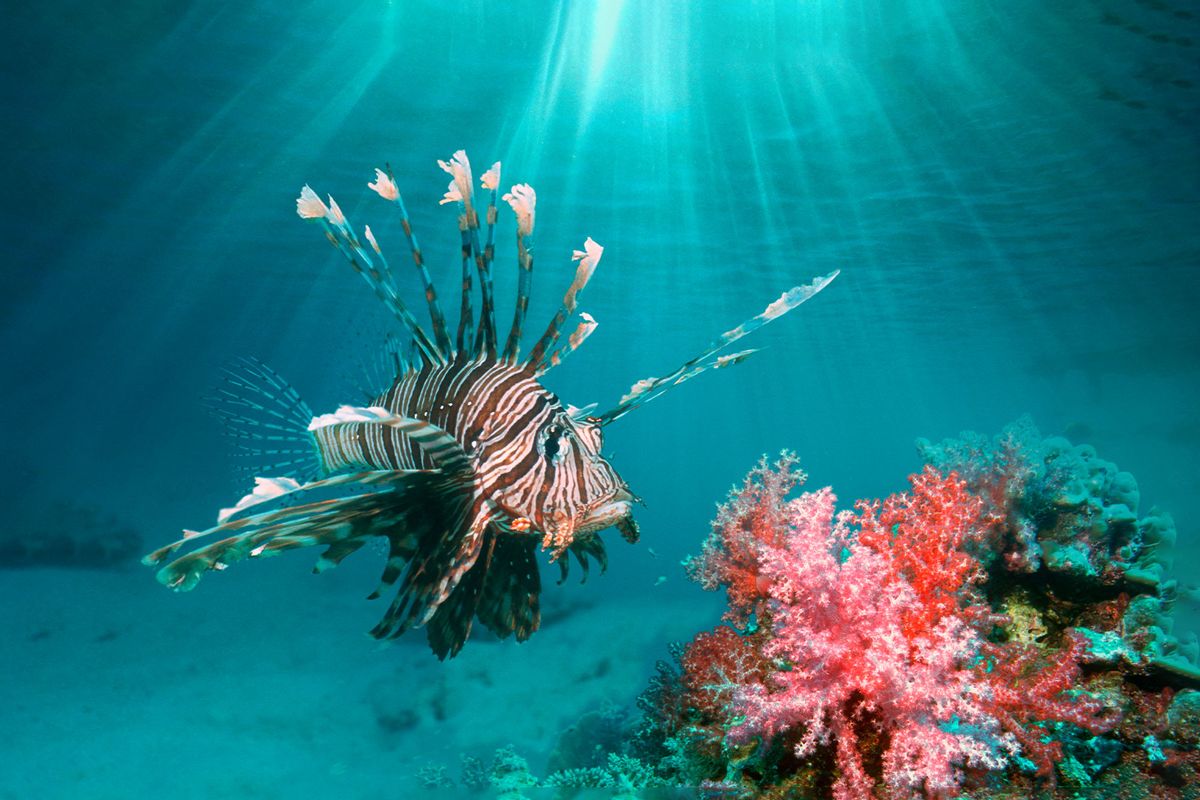Lionfish first appeared in the United States in 1985, off Florida's Atlantic coast. Native to the coral reefs around the South Pacific and Indian Oceans, they were originally brought to the States as exotic pets. It's believed that some of these pet owners eventually released their fish into local waterways — and unknowingly introduced an invasive species to the Gulf of Mexico.
Lionfish have no natural predators in the Gulf, can lay between 27,000 to 100,000 eggs every 2.5 days and decimate the ecology of local fish by consuming about 20 smaller fish every 30 minutes. After their initial appearance in Florida, they quickly spread to other states, but Florida continues to suffer from some of the most extreme consequences. In our southernmost state, lionfish wreak havoc on the food supply of native fish like grouper and snapper and their overconsumption of herbivorous fish results in damage to the reefs that line the Florida coast. It's a dangerous combination that could result in lionfish causing grave damage to the delicate balance of life in and around Florida and all the states bordering the Gulf of Mexico. That's where marine biologist Alex Fogg comes in.
Alex — currently the Coastal Resource Manager for Destin-Fort Walton Beach (DFWB) — grew up in a military family. Because his dad was in the Navy, no matter where they moved, he was never far from the water. From fishing and snorkeling to eventually diving, it was through his amphibious lifestyle that he grew a passion for marine biology. "Water activities were a huge part of my childhood," Alex said, "So I decided pretty early on that I wanted to go to school for a career that would keep me around the water. What better career than a marine biologist?"
After graduating from the University of South Carolina, he became one of the early responders to the Deepwater Horizon Oil Spill (the "BP oil spill") of April 2010 before moving to Mississippi to work with the National Oceanic and Atmospheric Administration. Alex spent over 200 days at sea in the following years, communing with divers and fishermen around the Gulf of Mexico in the process. There, he was given the chance to work on a project of his own making and he decided to focus his work (and subsequent Master's Thesis) around the increasingly abundant, yet understudied, lionfish. It was during this period that Alex learned a simple truth: Lionfish are delicious. Although their exteriors are colorful and vibrant, lionfish meat is white, flaky and subtle in flavor — comparable to tilapia but slightly sweeter and sturdier. So, in the hopes of getting more people interested in unconventional means of protecting their marine life, Alex created the one and only Lionfish Restaurant Week.
Though Lionfish Restaurant Week officially starts in May every year, its preparations begin during February's Lionfish Tournament, when Alex and his team encourage divers from all over the country to come to Destin-Fort Walton, Fla. to hunt lionfish. Unlike many other fish species along the coast, lionfish live so deep that they can't be caught with a net; they can only be caught by spearfishing. Over the course of months, divers are encouraged to hunt as many lionfish as possible for up to thousands of dollars worth of prizes. After Alex and his team calculate the number of fish each diving team catches, they divide the lionfish among local seafood restaurants (free of charge), allowing them to prepare for Lionfish Restaurant Week. "In many cases, restaurants are scared to pay the divers a premium for the lionfish because they may not sell," Alex said. "[The] restaurant week gives restaurants the opportunity to present a risk-free lionfish dish." Because the lionfish dishes sell out every year and draw in new crowds to local restaurants, he hopes that the success of Lionfish Restaurant Week will encourage restaurateurs to buy lionfish from local divers outside of the annual competition.
Now who would be given the immense power, the mystical fork of Poseidon itself, to judge this culinary phenomenon? Me, it turns out — along with a team of other journalists and marine specialists who had visited the restaurants anonymously each night of the competition. In addition to the flavors and presentation of the dish itself, participating restaurants were judged on their staff's knowledge of the environmental issues caused by lionfish and whether or not they promoted the special.
This year, eight eateries participated in Lionfish Restaurant Week and each prepared a dish completely unlike its competitors. We dined on blackened lionfish served over roasted corn and andouille maque choux (my personal favorite), plus a lionfish ceviche, at The Crab Trap. We ate coconut-crusted lionfish and a lionfish nigiri served three ways at Harbor Docks. We devoured deconstructed lionfish pad thai with teriyaki-glazed veggies at Brotula's. Ultimately, the winner was La Paz a family-owned Tex-Mex restaurant that served lionfish tostadas, epazote lionfish soup and lionfish fajitas.
Thrilling and tasty as Lionfish Restaurant Week is, there are tangible benefits to the community and waters surrounding DFWB thanks to this annual event. Ultimately, the work that Alex Fogg is doing to keep lionfish numbers under control isn't only helping to sustain local small business owners and divers — it's also showing immediate and long-term results in the oceans. Almost 25,000 lionfish were removed from the coastal ecosystem in preparation for Lionfish Restaurant Week, thanks to the divers who participated in the Emerald Coast Open Lionfish Tournament. While Alex doesn't believe that we can ever eradicate lionfish from our waters, these massive sweeps help to keep the ecosystem around Destin-Fort Walton Beach manageable for the other marine species.
Lionfish Restaurant Week is also a boon to the DFWB community. It revitalizes local eateries with out-of-town patrons and provides restaurateurs and chefs with a healthy dose of friendly competition and the space to show off their creativity. It's a concept that could (and should) be used to combat other edible invasive species, from water hyacinths to European green crabs. What's happening in this little corner of the Florida panhandle is proof that the more creative we can get with our sustainability efforts, the greater the beauty of the results.




Shares